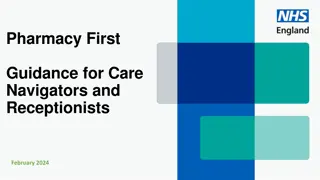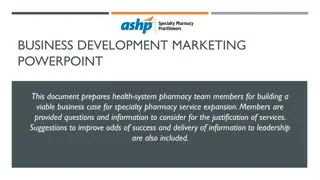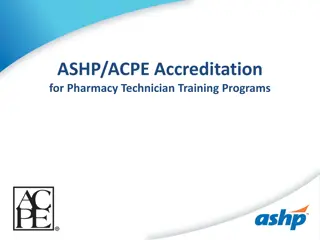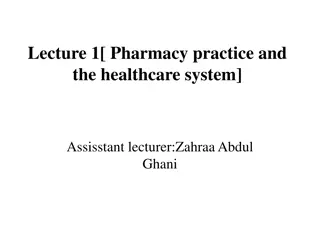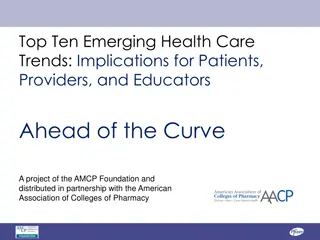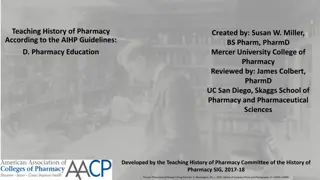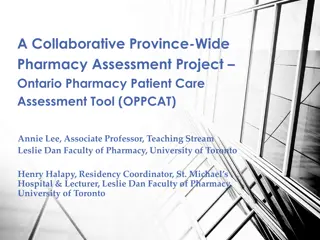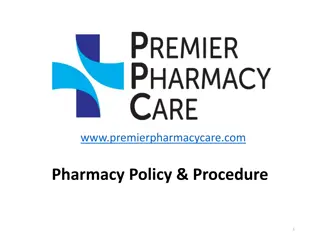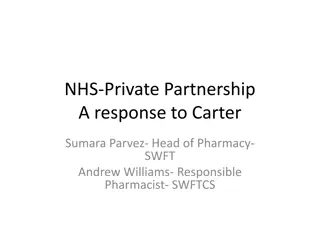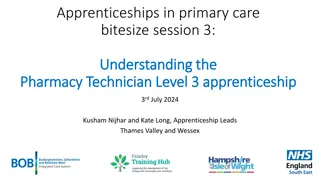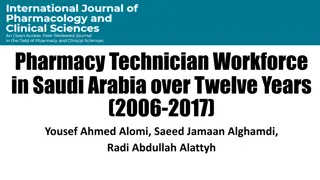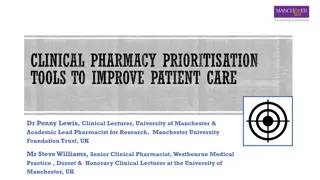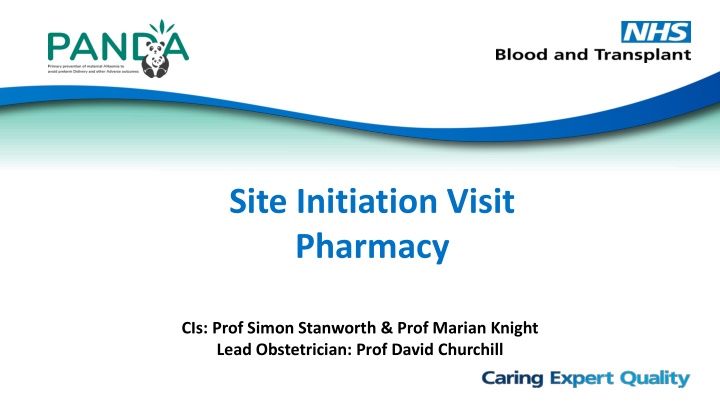
Preventing Maternal Anaemia: PANDA Research Programme Overview
Explore the PANDA Research Programme aiming to prevent maternal anaemia through a multi-centre trial of oral iron supplementation. Learn about the significance of preventing anaemia in pregnancy and the potential benefits for mothers and infants through this phase III trial. The research structure, trial design, and assessment schedule are detailed, highlighting the impact on adverse outcomes associated with anaemia during pregnancy.
Uploaded on | 0 Views
Download Presentation

Please find below an Image/Link to download the presentation.
The content on the website is provided AS IS for your information and personal use only. It may not be sold, licensed, or shared on other websites without obtaining consent from the author. If you encounter any issues during the download, it is possible that the publisher has removed the file from their server.
You are allowed to download the files provided on this website for personal or commercial use, subject to the condition that they are used lawfully. All files are the property of their respective owners.
The content on the website is provided AS IS for your information and personal use only. It may not be sold, licensed, or shared on other websites without obtaining consent from the author.
E N D
Presentation Transcript
Site Initiation Visit Pharmacy CIs: Prof Simon Stanworth & Prof Marian Knight Lead Obstetrician: Prof David Churchill
A phase III, multi-centre, randomised placebo-controlled trial of oral iron supplementation for the prevention of maternal anaemia (PANDA Prevention of Anaemia) Workstream 3, 4 & 5 of the NIHR-funded 'PANDA' research programme (Primary prevention of maternal ANaemia to avoid preterm Delivery and other Adverse outcomes)
Why do the research? Around 1 in 3 women in the UK develop anaemia during pregnancy. Anaemia is treatable in pregnancy, but we would like to prevent it. Anaemia is associated with adverse outcomes. Preventing anaemia may have long-term benefits for the mother and child These adverse outcomes include haemorrhage, prematurity, stillbirth, and maternal and neonatal mortality. Does universal primary prevention of anaemia during pregnancy with oral-iron supplementation have an incremental benefit on reducing adverse maternal and infant outcomes?
PANDA Programme Structure Recruitment from 25 + sites Recruitment from 5 + sites 4
Trial Design Multi-centre Randomised Double-blind Two-arm 200 mg Ferrous sulphate vs matched placebo 5
Trial Schema + 6 weeks delivery Delivery 28 Weeks Baseline CRF Remotely or in person Remotely or in person Pregnant women < 16 weeks gestation Iron Trial End (11,020 Participants) Randomise 1:1 Approach Consent 200 mg ferrous sulphate vs matched placebo Placebo Questionnaires completed remotely through central team 6
Schedule of assessments Baseline Eligibility Consent Randomisation Demographics Obstetric history Medical history Con-meds Lab tests (FBC) Fidelity checklist EQ5D Anaemia treatment EQ5D Delivery FBC Mother outcomes Baby outcomes +6 weeks delivery Mother outcomes Baby outcomes Healthcare resources Site collection 28 weeks FBC EQ5D MARS 5 Post birth questionnaire Interview EQ5D MARS 5 BI questionnaire Central team 7
Target Population Inclusion Exclusion Healthy non-anaemic pregnant women of all parities (haemoglobin concentration (Hb) 110 g/l measured by the first trimester blood profile) Known haemoglobinopathies (women with haemoglobinopathy trait are still eligible) Live fetus on a first trimester ultrasound scan Anaemia of any type 15 weeks + 6 days gestation or less Severe gastrointestinal disease Age 18 and above Allergies to iron Able to give informed consent Multiple pregnancies Haematological conditions that require ongoing treatment with either regular oral or intravenous iron or transfusions, e.g. dyserythropoiesis or other similar condition/disease. Chronic renal disease (requiring replacement therapy) Known haemochromatosis Recent red cell transfusion, within 30 days Eligibility must be confirmed by a medically qualified doctor Women who elect to take iron-containing (over the counter) supplements will not be excluded, but data on the form of supplement use will be collected. 8
Outcomes Primary outcome The primary outcome is a composite outcome of the proportion of pregnancies with pre-term birth (<37 completed weeks gestation), stillbirth (at 24 weeks gestation or above), neonatal death (up to 28 days) and small for gestational age (SGA) (<10th centile sex-specific weight for age, defined by UK growth charts). Some of the secondary outcomes Proportion of women developing anaemia Transitions in haemoglobin Primary postpartum haemorrhage Proportion of women who received red cell transfusions Proportion of women who received iron infusions Proportion of women with an infection and or sepsis 9
Randomisation How to randomise participants: There is no electronic randomisation system Randomisation occurs when the IMP kit is provided to participant Randomisation code is the kit number of the kit box. This needs to be logged before providing the kit to the participant and recorded in the eCRF and accountability log. Participants should be provided with an ID card, populated with the kit ID and their unique study ID, to carry with them in cases where unblinding is required. 11
Co-enrolment Co-enrolment is allowed in the PANDA study with CI approval. If any participants are identified within another trial please contact us to discuss if participation within PANDA is possible. Please also check the co-enrolment requirements of the other identified trial as they may prohibit it. 12
NIHR Associate PI Scheme The Associate PI Scheme is a six month in-work training opportunity, providing practical experience for healthcare professionals starting their research career. The healthcare professional works alongside the Local PI for six months The Local PI acts as a mentor to the Associate PI During their time on the Scheme, the Associate PI must complete a checklist of study activities and a learning pathway on NIHR Learn The NIHR Associate PI Scheme team will then issue a certificate https://www.nihr.ac.uk/health-and-care-professionals/career- development/associate-principal-investigator-scheme.htm 13
Investigational Medicinal Product (IMP): Ferrous sulphate & matched placebo
IMP: Ferrous sulphate & Placebo IMP: 200 mg ferrous sulphate (65 mg iron) sugar-coated oral tablets and matched placebo obtained from WGK Ltd. IMP storage according to local practice and SmPC. Can be stored in the maternity unit if local site approvals are in place. This can be enabled by a local risk assessment of the storage location. Examples of where sites currently do this can be provided. Stock management centrally through WGK but sites should also log stock as per local practice. Accountability logs must be completed throughout the study and returned to the central team on request. On receipt of IMP, download data from temperature logger and send to WGK If pharmacy allows, IMP can be posted to participants using local procedures. 15
IMP: Dispensing On dispensing to participants the kit code must be recorded and noted in the medical notes, stock accountability log and entered into the database. Sites can use their own prescription templates on approval from the CTU. The PANDA template version is supplied in the ISF. Ferrous sulphate is a licensed product and falls under exemption for midwives to provide. Please check with local policy of dispensing/prescriptions for CTIMP studies. The IMP kits come in dispensing boxes. They must not be removed from the dispensing box for any other reason other than providing to participant. One box should be dispensed per participant, normally at the baseline visit. Sufficient tablets are provided to last for treatment from week 12 of pregnancy to +6 weeks after delivery (240 tablets). 16
IMP: Dispensing IMP dispensing box prototype 17
IMP: Dispensing Remind participants to keep IMP out of reach of children and report any incidents e.g. accidental consumption by child or overdose Participant ID card to be provided (by research midwife) includes: o Participant ID (added by research midwife) o Kit ID (added by research midwife) o Site contact details o Emergency details N.B. remind the participant to notify the local research team if they are diagnosed with anaemia In the event of an emergency and unblinding is required, the unblinding contact details can be found in the pharmacy and trial manuals. 18
Monitoring schedule and type PANDA-Prevention study is a Type A low risk study; Monitoring carried out by the central research team will be: 1) Remote monitoring once per year, the first of which will occur 6 months after activation. 2) On-site monitoring will occur only if triggered as a result of safety concerns, poor protocol compliance, lack of site communication etc. Close out visit Close out visit will be performed remotely 20
Monitoring schedule and type Investigator Site File review to ensure ISF is kept up to date Source data review and verification Pharmacy review pharmacy file review for completeness, review of prescriptions, accountability log and reconciliation of returns. Discussion with the site team on any issues, provide additional training if required, ensure compliance to the protocol/GCP. If the visit is triggered, the focus of the visit will be on the cause of the trigger, e.g. due to protocol breach, SAE reporting etc. Monitoring feedback letter will be sent to the site, citing any outstanding issues that needs to be resolved by the site. 21
Document management It is the responsibility of the site to maintain the essential documents in the ISF and pharmacy file: Maintain and update delegation log (send to PANDA@nhsbt.nhs.uk). CVs and GCP certificates for all team members on the delegation log. All updated documents sent by the central trial team should be filed in the corresponding section of the ISF and all previous versions marked as superseded. Confirmation of receipt will be required for an audit trail. 23
Contacts: NHSBT CTU Investigators Thank you for listening Clinical Operations Manager: catherine.bain@nhsbt.nhs.uk Chief Investigator: simon.stanworth@nhsbt.nhs.uk Clinical Trial Manager: eleanor.hounslea@nhsbt.nhs.uk Lead obstetrician: david.churchill1@nhs.net Any questions? Clinical Trial Coordinator: valerie.hopkins@nhsbt.nhs.uk General mailbox: PANDA@nhsbt.nhs.uk



